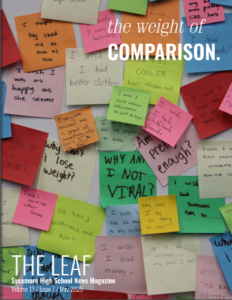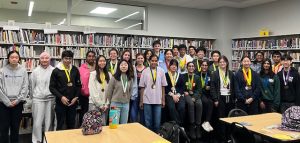Expert advice for exam excellence
Stanford University law degree student Donna Long looks at her textbook during Bob Gordon’s law class, September 24, 2013, in Stanford, California. With applications down and job prospects for their heavily indebted graduates diminished, law schools are in trouble. (Dai Sugano/Bay Area News Group)
May 29, 2015
With finals just around the corner, students find themselves scrambling, studying, and stressing.
“[Exams are] stressful because teachers give review stuff to us so late. Plus it’s hard to focus when I’m so excited about summer; just the fact that it’s the last week of school gets me distracted,” freshman Thea Ferdinand said.
Here are a few helpful tips to make for efficient review.
Studying for the exam
- Turn down for the test- Studies have shown that those who studied or memorized in silence without any music did better than those who tried to memorize things while listening to all types of music. Students love listening to their favorite tunes when they study, so if you absolutely need the sound than classical music would be the best bet.
Lyrical songs can distract with the content of the songs themselves and get stuck in your head, a risk that is significantly less with the classics, preferably Mozart. According to the Mozart Effect, listening to Mozart improves memory and makes babies smarter.
- Switch study spots-Psychologists have shown that spending all night cramming (another no-no) in one location can be more draining for the mind.
Instead of being holed up at your desk, try alternating between the library, a study room, a quiet café (Starbucks, Brueggers Bagels), or even just a room with windows and a peek at the outside world.
- Ditch distractions– It is hard to focus when teens are constantly surrounded by technology that allows them to access the world at their fingertips. When you decide to sit down and study, put your cell phone out of reach, like on the kitchen table.
Prepare before beginning, checking that you have snacks and water so that you cannot make excuses to get up and wander around.
- Put on the brakes and take breaks– Your brain takes up glucose when you study, so taking ten-fifteen minute snack and stretch breaks every hour help reenergize the brain and distributing learning over time is better than cramming.
- Apps to ace APs- There are various programs like Focalfilter and StayFocused allow you to set certain periods of time where you can only access certain websites you need for studying, like Google or Blackboard.
“Actually, I wouldn’t use something like this. It may not be very efficient but I like getting distracted. I can’t focus for that long,” freshman Adam Meller said.
- Test before the test– Find various ways to test and reinforce your knowledge as you study instead of just reading through a page of notes. Instead, you could see a certain key word and make yourself recite or explain the necessary information about that word.
Even just reading things aloud as you read; you are 50% more likely to remember something if you hear yourself read it aloud. Also, make flashcards or looking at other people’s flashcards on Quizlet.
“My science teacher makes Quizlets for all of her chapters, that’s practically all I use to study,” Ferdinand said.
When one is desperate
- Sheep arithmetic… and trigonometry- While cramming is potentially one of the worst studying strategies, if all your time-management falls through, studying right before sleeping helps significantly. However, do not study on the bed, as you will likely fall asleep on the textbook.







